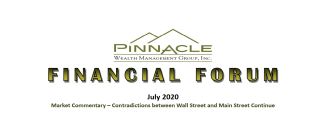
Financial Forum July 2020
Market Commentary – Contradictions between Wall Street and Main Street Continue
The Chinese symbol for “crisis” is made up of two symbols – one representing “danger” and the other representing “opportunity.” So maybe it’s symbolic that the largest crisis most of us have ever witnessed in our lifetime originated in China. The novel Wuhan coronavirus, known as COVID-19, has thrown world economies and health officials into a tailspin. The dangers of this crisis are easy to see; the opportunities will present themselves over time. Since the COVID-19 crisis started in China last year, the world has witnessed the worst global pandemic since the Spanish flu of 1918 – approximately 10 million confirmed cases and 500,000 deaths worldwide causing:
- 47 million first-time filers for U.S. unemployment benefits in the last 14 weeks.
- Unprecedented market volatility that saw the S&P 500 fall almost 40% in a matter of a few weeks.
- A huge quantitative easing (QE) program by the Fed that has resulted in the buying of Treasuries, corporate bonds, and even exchange-traded funds (ETFs).
- Historic government stimulus which has increased our federal deficit by almost $4 trillion and counting.
- A temporary economic shutdown both at home and abroad causing a rise in corporate bankruptcies and a decline in consumer spending.
- The largest social movements in decades.
Opportunities include:
- Accelerated advances in healthcare, especially in vaccine development. Also, future opportunities for biotech companies to collaborate to help solve future emerging health crises.
- Opportunities for companies to develop advanced technologies to help people work from home, including better internet security, cloud development, simultaneous sharing of work documents, etc.
- Moving of global supply chains back to America, creating new jobs for our nation’s middle class.
- Many more yet to be determined.
After the initial shock of the virus wore off, Wall Street staged an impressive rally on hopes that a V-shaped recovery would happen powered by unlimited Fed money printing, vaccine hopes, the reopening of many businesses across the country, and another potential stimulus bill being passed in July. However, on Main Street there appears to be a big disconnect with Wall Street’s optimism as individuals and businesses are struggling. For example, after most businesses have reopened, there are still about 20 million people unemployed - and those folks represent customers. All the job gains during the prior decade were wiped out in a matter of weeks. Many businesses, including airlines, hotels, restaurants, brick-and-mortar retailers, autos, professional sports, casinos, theme parks, and large convention centers are doing a fraction of their pre-coronavirus levels. Profit margins have dropped to levels not seen since the Great Recession. State and local governments are running huge fiscal deficits as costs have skyrocketed and tax revenues have plunged. That’s not to mention the estimated $4 trillion deficit the federal government is expected to incur this fiscal year. All of this and more has led the IMF to lower its outlook for global growth to shrink by 4.9% in 2020 as the organization called COVID-19 a “Crisis like no other.” Even U.S. Federal Reserve Board Chairman Powell has warned investors that we have a long economic recovery ahead. He is very concerned about displaced workers finding new jobs.
To make matters worse, the U.S., as well as other countries, seem to be experiencing a second wave of infections, as businesses reopen and young people ignore social distancing and mask wearing recommendations. Last week, coronavirus cases surged in the U.S., outstripping a peak not seen since the worst day in April and prompting some states and cities that have reopened quickly or shunned shutdowns to reverse course. Texas and Florida, for example, took steps, such as closing bars and issuing new stay-at-home orders, to keep people home. The surge of new cases raised doubts about the speed of economic recovery, causing stocks to fall at the end of the quarter. Perhaps the disconnect between Wall Street and Main Street is narrowing…
What We’re Watching: We believe the next six weeks should provide “some” clarity on both the health and economic crises. Specifically: (1) What is the outlook for COVID-19 cases? If virus data spikes higher, that will obviously be a headwind on stocks because it will materially delay the return to economic normalcy. (2) Will another stimulus bill be passed by July? Approximately two-thirds of people receiving federal unemployment assistance are now making more than they would if they were working. Whether you believe that is wrong or right is of no concern to the market because it has gone a long way, along with PPP loans to businesses, to support the economy and not make the fallout worse. (3) Is the economic data improving and, if so, by how much? We know there was a solid bounce in activity in May; but we don’t know how much ground the economy can recover this summer, or whether we can expect activity that’s anything close to pre-coronavirus levels. The June and July data should go a long way towards telling us what to expect for the remainder of the year. Longer term, we still have tensions with China and an upcoming Presidential election to worry about. Rest assured, we are staying on top of these developing situations.
Wealth Management – Expanded Coronavirus Relief for IRA Minimum Distributions
The recently passed CARES Act suspended the need for retirees to take a Required Minimum Distribution (RMD) for 2020. This legislation, which was enacted in March, caused a problem for some retirees who had already taken their RMD prior to the law taking effect. In response to this problem, the IRS in April extended its usual 60-day period for rollovers until July 15, 2020 for RMDs taken between February 1 and May 15, 2020. Of course, that didn’t help those individuals who had taken their distributions in January, and the relief didn’t apply to non-spouse beneficiaries of inherited IRAs. To rectify the situation, the IRS has now granted rollover relief to non-spouse inherited IRA owners and to those who took RMDs at any time this year. The IRS has also extended the time to put the RMD back into your account until August 31, 2020.
Bottom Line: Although it took some time to get this right, the IRS has allowed all taxpayers who were subject to RMDs to put the money back into their accounts, without taxes and penalties, by August 31. If you are now eligible to do this and would like to take advantage of this one-time relief, please give us a call. We would be more than happy to assist you with this.
Quarterly Thought – Happy Fourth of July!
As we celebrate our country’s birthday, let’s be thankful for all that we have accomplished as a nation and be mindful of how we can still make America an even better and stronger nation TOGETHER. All of us at Pinnacle Wealth Management Group, Inc. would like to wish you and your family the happiest and healthiest of holidays.
To learn more, call our office or CLICK HERE to request a meeting today!
(734) 667-5581
Pinnacle Wealth Management Group, Inc.
www.pwmgi.com
849 Penniman Ave, Suite 201, Plymouth, MI 48170
Securities offered through Private Client Services, Member FINRA/SIPC. Advisory products and services offered through Pinnacle Wealth Management Group, Inc., a Registered Investment Advisor. Private Client Services and Pinnacle Wealth Management Group, Inc., are unaffiliated entities.
The opinions voiced in this material are for general information only and are not intended to provide specific advice or recommendations for any individual. To determine which investment(s) may be appropriate for you, consult your financial advisor prior to investing. All performance referenced is historical and is no guarantee of future results. All indices are unmanaged and may not be invested into directly.
The economic forecasts set forth in the presentation may not develop as predicted and there can be no guarantee that strategies promoted will be successful.

